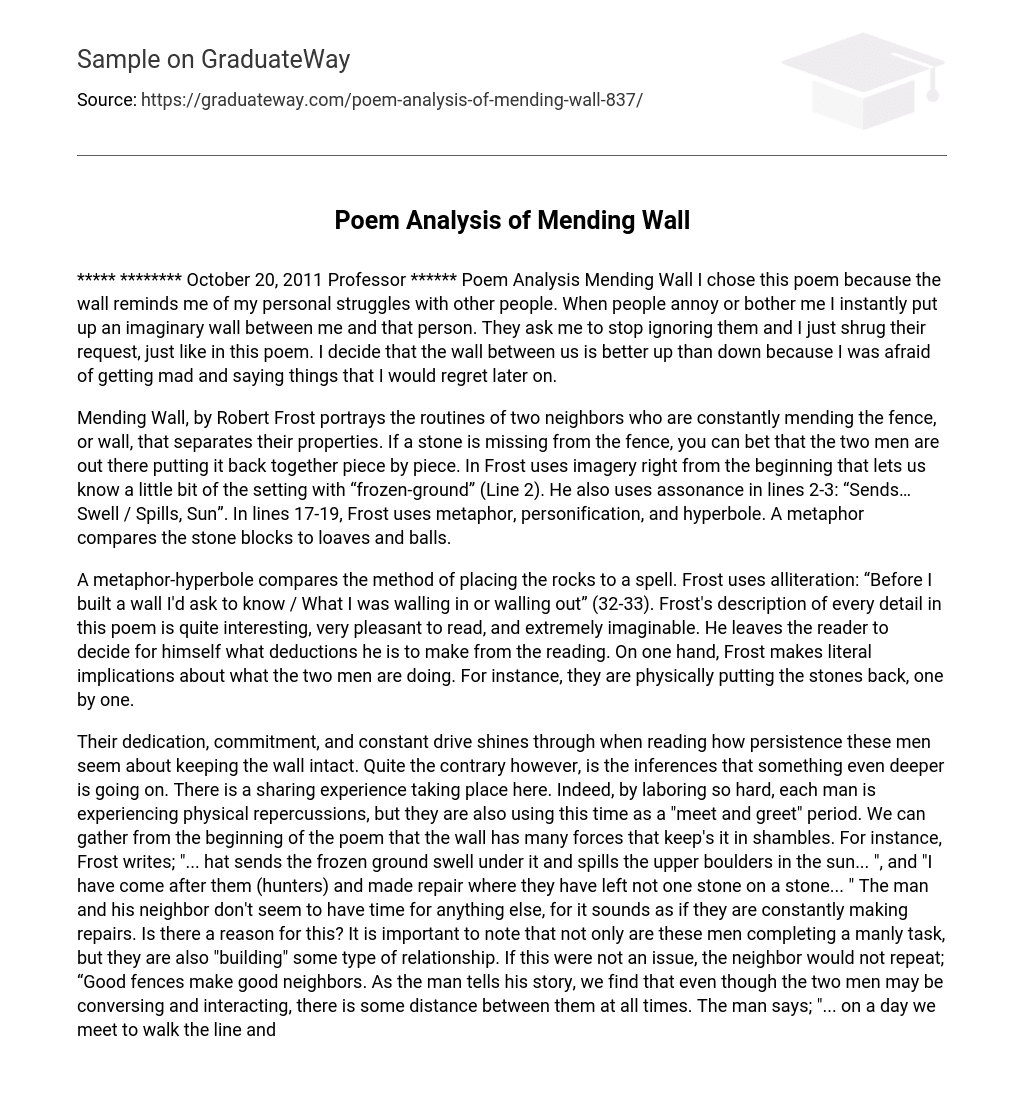I selected this poem because it resonates with the challenges I face in my interactions with others. Whenever someone annoys or disturbs me, I immediately create a figurative barrier separating me from that individual. They implore me to stop disregarding them, but my response is merely a shrug, mirroring the sentiments expressed in this poem. I conclude that maintaining this wall between us is preferable because I fear becoming angry and uttering words I would later regret.
Robert Frost’s poem “Mending Wall” exhibits the repetitive nature of two neighbors as they continually repair the fence separating their properties. Whenever a stone is absent from the fence, these men can be found diligently restoring it piece by piece. Frost initially establishes the atmosphere by incorporating the imagery of “frozen-ground” (Line 2). Additionally, he employs assonance in lines 2-3, where he writes, “Sends…Swell / Spills, Sun”. Furthermore, Frost employs metaphor, personification, and hyperbole in lines 17-19. Through metaphor, he likens the stone blocks to loaves and balls.
The poet Robert Frost employs a metaphor-hyperbole in which he compares the act of placing rocks to a spell. Frost also incorporates alliteration in the lines “Before I built a wall I’d ask to know / What I was walling in or walling out” (32-33). The poem is filled with detailed descriptions that are captivating, enjoyable to read, and easy to visualize. Frost intentionally leaves it up to the reader to interpret and draw conclusions from the poem. On one hand, Frost directly suggests that the two men are physically replacing the stones one by one.
The men’s dedication, commitment, and constant drive shines through their persistence in keeping the wall intact. However, there are deeper inferences that suggest something more is going on. A sharing experience is taking place as they labor hard, causing physical repercussions but also using this time as an opportunity to meet and greet. From the poem’s beginning, it is evident that the wall faces various forces that contribute to its destruction. For instance, Frost writes about the frozen ground causing the wall to swell and boulders spilling in the sun. He also mentions repairing the wall where hunters have left no stone on a stone.
Both the man and his neighbor appear to be constantly engaged in repairing tasks, leaving little time for anything else. This repetitive repairing seems to serve as a means for building a deeper connection between them. The neighbor emphasizes the importance of maintaining good fences to foster good neighborly relations. The man’s story reveals that although they may engage in conversation and interaction, there remains a certain distance between them.
The man states; “… on a day we meet to walk the line and set the wall between us once again.” This suggests that although friendship is important, it is also crucial to have personal boundaries. The poem portrays the situation as if it were a game. Indeed, he describes it as “just another kind of outdoor game.” The narrator further emphasizes, “We keep the wall between us as we go.”
This text suggests that there is a comparison between two individuals, using the analogy of a game of leapfrog. The quote “He is all pine and I am apple orchard” implies that they each have their own unique characteristics and preferences. One person is associated with farming apples, while the other person is connected to pines. Despite their differences, both individuals possess distinct qualities that are charming. Furthermore, the mention of the “stone” in Frost’s poem invites reflection on its meaning. The line “Stay where you are until our backs are turned” adds to the overall message being conveyed.
The speaker addresses the stones, asking them to wait until he is not looking if they are going to fall. This unusual aspect adds an interesting element to the poem, suggesting that the speaker is so bored that he would converse with anything, even inanimate objects. Perhaps the neighbor is not as talkative as initially thought, leaving the speaker with only himself and these lifeless objects to talk to. It is worth noting that the only quote by the neighbor in the poem is “Good fences make good neighbors.” On another note, this hints at a theme of separation or segregation.
The text suggests that the wall symbolizes both unity and separation between the two men. While it brings them together as they work on repairing it, it also serves as a barrier that keeps them apart. The author also explores the notion of segregation in society, indicating that differences between individuals can lead to inequality. The narrator and his neighbor are depicted as not being considered equals due to their differences. The repetition of the neighbor’s statement “Good fences make good neighbors” emphasizes the idea of creating boundaries. Ultimately, the poem examines the wisdom behind building walls and other forms of barriers.
The poem suggests that a wall acts as a hindrance to progress and social consensus. Removing the wall, like the enigmatic “something” mentioned in the beginning and end lines, allows for communication, friendship, and unity. However, it also exposes oneself to vulnerability and the unfamiliar. Nevertheless, the neighbor asserts that walls are beneficial for maintaining good relationships. Yet, the poem implies that walls may indeed be necessary in certain situations – “Before I built a wall I’d ask to know… whom I was like to give offense” (33-35). This statement indicates that the speaker supports a wall with a clear purpose.
All structures need walls to remain stable and secure, preventing undesired elements from entering and valuable contents from escaping. Surprisingly, even though good walls are commonly associated with preserving amicable relationships, the persona in the poem annually aids in rebuilding an unnecessary wall out of habit, fostering unity. He resists having a wall that generates discord between himself and his neighbor, considering the supposedly redundant barrier as vital.





